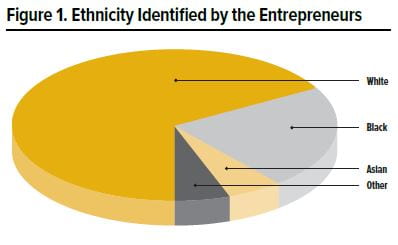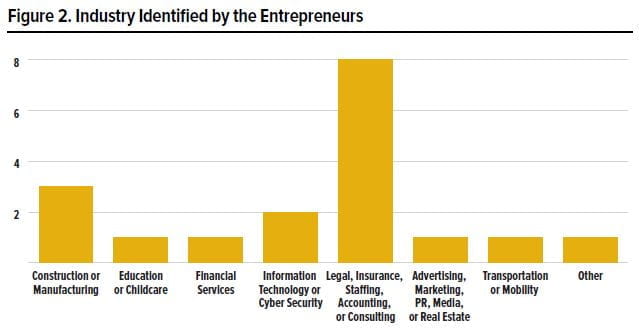R. Gabrielle Swab
Assistant Professor, Towson University, Department of Management
Jan Baum
Director and Professor of Entrepreneurship, Towson University, Department of Management
Lisa V. Byrd
Director of Events and Business Development, Lead Staff, Baltimore Women’s Advisory Board,
Greater Baltimore Committee
Jennifer Stano
Sr. HR Partner, Towson University, Office of Human Resources
In 2020, the COVID-19 pandemic disrupted labor markets
on a global scale, with employers and employees dealing
with the short-term and long-term sudden and often
severe consequences. Many shuffled to adjust to at-home
work environments, while millions of others were less
fortunate, being furloughed or faced with job loss. Subsequent
pandemic-related research and studies focused
on the macro level of national and global economies,
while small business owners, entrepreneurs, and female
entrepreneurs were largely neglected.
While the economic losses from the pandemic were
huge, the pandemic specifically took a toll on the female
workforce, with female job loss totaling 5.4 million
compared to male job loss at 4.4 million (Ewing-Nelson,
2021; Ellingrud & Segel, 2021). While the years of 2020
and 2021 may be over, the pandemic and the significant
financial insecurity many women and their families are
facing are not (Boesch & Phadke, 2021). However, women
and entrepreneurs create an interesting and unique
context of individuals to consider during a time where
both personal and professional changes are happening
rapidly, and without much foresight into the future.
Female small business owner Carla Nelson Chambers,
founder of The Nelson Ideation Group, says, “as women,
we can turn on a dime”, and as “entrepreneurs, we have
to do that anyway.” She further clarified that “Women are
able to make <those> changes very quickly because we
are so used to, as women, figuring out what is the need
for my family, for my friends, for me.” Entrepreneurs
and women alike have a unique mindset in creating
ways to stay viable, whether it be for their business,
or those around them (e.g., Ambepitiya, 2016; Patil &
Deshpande, 2018).
In this regard, a discussion highlighting female entrepreneurs
as a growing and erudite success story deserving
attention in the pandemic conversation. They represent
a group of emerging business leaders that can teach us
as individuals, managers, or leaders survival skills in
these unprecedented times.
To learn the valuable lessons female entrepreneurs have
to offer, our research team partnered with the Greater
Baltimore Committee (GBC) and its Baltimore Women’s
Advisory Board (BWAB). In doing so, we conducted a
survey to investigate the impact of the pandemic on
women in the workplace within the Greater Baltimore
region. We had a final 433 male and female respondents
across a variety of industries and roles that completed a
survey of questions ranging from organizational support,
job satisfaction, stress, to discrimination. If individuals
identified themselves as an entrepreneur, they were
asked additional quantitative questions related to entrepreneurial
identity and persistence, as well as qualitative
questions regarding their business pre, during, and post
pandemic. From the original 433 participants, we had 18
female entrepreneur respondents within the region that
provided our team with both quantitative and qualitative
data. Based on discussions and feedback from our
sample, we have compiled a look into how this group
is pivoting during the pandemic.
The Sample
Within our sample, we found a mix of entrepreneurs who
had been in business over 20 years, down to those who
had started their business within the year prior to the
pandemic. Among the 18 female entrepreneurs, there
was one in the 26-35 age group, four in the 36-45 age
group, five between 46-55, five between 56-65, two 65
or older, and one did not disclose their age. The ethnic
diversity of the entrepreneurs is reported in Figure 1,
while the industry in which the sample identified with
is in Figure 2.
Lessons Learned from an Entrepreneurial Mindset
Entrepreneurs tend to have a more proactive personality,
higher resilience, greater self-efficacy, and a more positive
stress mindset, meaning they respond to challenges with
motivation versus defeat (Li et al., 2020; Neneh, 2019).
However, one does not have to be an entrepreneur, nor
possess all of the aforementioned qualities, to develop
an entrepreneurial mindset. Observations based on
their responses provide insight into the mindset and
unique ways entrepreneurs adapt to change and stay
viable during adversity.
(1) Recognize when to Pivot
“We took immediate action in 2020 to be proactive around
safe work practices, such as PPE and a combination of
telework.”
“The business did lose out on revenue due to the stay home
order but I am now currently writing a book.”
Entrepreneurs have an innate ability to recognize an
opportunity (Kirzner 1973) and thus, a question surrounding
entrepreneurship research is why entrepreneurs
recognize opportunities that non-entrepreneurs fail
to see (Dyer, Gregerson, & Christensen, 2008). Popular
explanations for their unique opportunity recognition
may include personality, cognitive, or social network
differences. In turn, these thought processes are linked
to one’s perceptions of risk-taking, tolerance for ambiguity,
or one’s locus of control (meaning one’s view on
whether or not they have the ability to influence a situation)
for example.
With feedback from our sample and with the support of
other entrepreneurial research (Dyer et al., 2008), both
entrepreneurs and organizational leaders recognize
opportunities for innovation by frequently asking questions
that may challenge the status quo. This includes
questions regarding what the future may hold. Second,
entrepreneurs can explore these questions and/or their
environment by creating hypotheses and testing them
along the way. Third, through the engagement of idea
networking, they can test their hypotheses on a network
of individuals with differing perspectives, thus learning
from others as well. Finally, engaging in these processes
leads to pattern recognition and thus, the discovery of
new ideas.
(2) Increase Resilience
“I opted to use <a> business coaching program to stay
connected to more people during the pandemic and
it has been a wonderful thing both for learning online
marketing gaps I knew I needed to fill and in helping to
keep a vibrant tribe.”
“I embarked upon my venture a few weeks prior to COVID.
COVID made things a lot more difficult – specifically,
acquiring financing, and solidifying client retention.
COVID also put an additional strain on family income
because it shut my spouse’s business down for several
months. However, it also gave my business somewhat
of a competitive advantage because our skillset could
manage virtual interpersonal relations better than many
of our competitors.”
Resilience is described as “The capacity of a system
to survive, adapt and grow in the face of change and
uncertainty” (Fiksel, 2006, p. 21). The COVID-19 pandemic
not only disrupted the entire economy, but had a
significant impact on peoples’ personal and professional
lives. It is within this context that the heightened levels
of resilience often found in entrepreneurs (Bullough et
al., 2014) allowed them to shift and reinvent (their businesses)
during this time. For example, regardless of a
positive, negative, or generally significant event – the
interpretation, coping mechanisms, and other individual
differences (e.g., resilience, stress mindset) of an entrepreneur
influences the viability of their venture, and
further, the long-term effects of their business. Events
– such as the pandemic – also determines their view on
needed resources, which largely influences their wellbeing
and start-up persistence (Marshall, Meek, Swab,
& Markin, 2020).
These heightened levels of resilience “maintain relatively
stable, healthy levels of psychological and emotional
functioning over time” (Corner, Singh, & Pavlovich, 2017,
p. 688), though active steps can be taken to increase
resilience. According to psychologist Susan Kobasa,
resilience stems from first, viewing difficulty as a challenge
rather than a paralyzing event, second, staying
committed to your life and goals (this includes work as
well as relationships, spiritual beliefs, etc.), and third,
focusing on those events or situations that you have
control over, which in turn leads to greater empowerment
and confidence.
(3) Learn from the Past to Shine Light on Future Directions
“I have learned that remote work can be positive.”
“I convinced my mom it would be a good idea to close
down our showroom and strictly do online sales from
our warehouse. This was one of the best decisions we’ve
made and have seen a large increase in revenue since
going to strictly online sales.”
Both opportunity recognition and heightened resilience
further allows for a greater ability to learn. Combining
these mindsets and learning from the past increases the
ability to cope with failure (Singh, Corner, & Pavlovich,
2007), along with the emotions and cognitive processing
in which to do so (Byrne & Shepherd, 2015). Entrepreneurs
perceive heightened learning, such as the ability
to transfer knowledge from one venture to the next,
when they first, choose to attribute the failure to internal
causes and second, start a second venture quickly after
failure (Yamakawa & Cardon, 2015). Therefore, reflecting
on past controllable steps, combined with a rapid view
on how to move forward, increases both learning and
a look into ways to move forward.
Final Thoughts
Discussions on the mindset of entrepreneurs may not
initially appear relevant to those in a large organization
or in a corporate role. However, according to a
study led by the Boston Consulting Group, one in three
companies requires a turnaround, at any point in time.
In this regard, organizations, and those entrepreneurs
or leaders, must be frequently prepared for changes
to their operations or strategies. We encourage these
considerations in not only the pandemic, but also during
general organizational change.
References
Ambepitiya, K. R. (2016). The role of women entrepreneurs in establishing
sustainable development in developing nations. World Review
of Business Research, 6(1), 161-178.
Boesch, D., & Phadke, S. (2021). When women lose all the jobs:
Essential actions for a gender-equitable recovery. Center for American
Progress.
https://www.americanprogress.org/issues/women/
reports/2021/02/01/495209/women-lose-jobs-essential-actions-genderequitable-
recovery/
Byrne, O., & Shepherd, D. A. (2015). Different strokes for different
folks: Entrepreneurial narratives of emotion, cognition, and making
sense of business failure. Entrepreneurship
Theory and Practice, 39(2), 375-405.
Corner, P. D., Singh, S., & Pavlovich, K. (2017). Entrepreneurial resilience
and venture failure.
International Small Business Journal, 35(6), 687-708.
Ellingrud, K., & Segal, L.H. (2021). COVID-19 has driven millions of
women out of the workforce. Here’s how to help them come back.
Fortune. https://fortune.com/2021/02/13/covid-19-women-workforceunemployment-
gender-gap-recovery/
Ewing-Nelson, C. (2021). All of the jobs lost in December were
women’s jobs. Washington: National Women’s Law Center. https://nwlc.
org/wp-content/uploads/2021/01/December-Jobs-Day.pdf
Dyer, J. H., Gregersen, H. B., & Christensen, C. (2008). Entrepreneur
behaviors, opportunity recognition, and the origins of innovative
ventures. Strategic Entrepreneurship Journal, 2(4), 317-338.
Fiksel, J. (2006). Sustainability and resilience: toward a systems
approach. Sustainability: Science, Practice and Policy, 2(2), 14-21.
Kirzner, I. M. (1973). Competition and entrepreneurship. Chicago:
University of Chicago Press.
Li, C., Murad, M., Shahzad, F., Khan, M. A. S., Ashraf, S. F., & Dogbe, C.
S. K. (2020).
Entrepreneurial passion to entrepreneurial behavior: Role of
entrepreneurial alertness, entrepreneurial self-efficacy and proactive
personality. Frontiers in Psychology, 11, 1611.
Marshall, D. R., Meek, W. R., Swab, R. G., & Markin, E. (2020). Access
to resources and entrepreneurial well-being: A self-efficacy approach.
Journal of Business Research, 120, 203-212.
Neneh, B. N. (2019). From entrepreneurial intentions to behavior:
The role of anticipated regret and proactive personality. Journal of
Vocational Behavior, 112, 311-324.
Patil, P., & Deshpande, Y. (2018). Women entrepreneurship: a road
ahead. International Journal of Economics, Business, and Entrepreneurship
(IJEBE), 1(1).
Singh, S., Corner, P., & Pavlovich, K. (2007). Coping with entrepreneurial
failure. Journal of Management & Organization, 13(4), 331-344.
Yamakawa, Y., & Cardon, M. S. (2015). Causal ascriptions and perceived
learning fromentrepreneurial failure. Small Business Economics,
44(4), 797-820.


